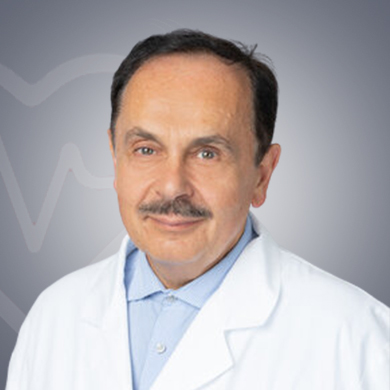
Surgical Oncologist
Kardiolita Hospital, Vilnius , Vilnius, Lithuania
42 Years of experience
Speaks: English
Dr. Valerijus Ostapenko is a specialized Surgical Oncologist in Lithuania. And one of the most sought after medical specialists in Vilnius, Lithuania. The doctor has over 42 Years of experience and is associated with Kardiolita Hospital, Vilnius.
Association and Memberships Dr. Valerijus Ostapenko is part of:
Qualifications :
Hospital Address :
Kardiolitos klinikos
Medical Expertise of Dr. Valerijus Ostapenko

General & Laparoscopic Surgeon
Kardiolita Hospital, Vilnius , Vilnius, Lithuania
13 Years of experience
Speaks: English
Dr. Rimantas Bausys is a specialized General Laparoscopic Surgeon in Lithuania. And one of the most sought after medical specialists in Vilnius, Lithuania. The doctor has over 13 Years of experience and is associated with Kardiolita Hospital, Vilnius.
Qualifications :
Hospital Address :
Kardiolitos klinikos
Medical Expertise of Dr. Rimantas Bausys
Please make sure to see your doctor using Telemedicine before you even board a flight
Given below are some of the most sought after Cancer Specialists available for online consultation in Vilnius, Lithuania:
Given below are some of the most popular hospitals in Vilnius, Lithuania where Cancer Specialists work:
An oncologist is a doctor who specializes in diagnosing and treating cancer. If you have cancer, a cancer specialist will design a treatment plan based on pathology reports that say what type of cancer you have, up to what extent it has developed, how quickly it is likely to spread, and what body parts are affected.
As most cancers are treated through a combination of therapies, you could see several different kinds of cancer specialists during the course of your treatment. The types of cancer specialists include:
Medical oncologists: Medical oncologists treat cancer using hormonal therapies, chemotherapy, biological therapies, and other targeted treatments. People often consider a medical oncologist as their primary cancer doctor.
Radiation oncologists: Radiation oncologists use high-energy photon beams to destroy cancer cells.
Surgical oncologists: A surgical oncologist may be the first doctor you may see if your primary care physician thinks that you have cancer. Surgical oncologists often perform a biopsy, which involves the removal of a small section of tissues to check for cancer cells.
Pediatric oncologists: A pediatric oncologist specializes in certain types of cancer, and conducts research on childhood cancers.
Gynecologic oncologists: Gynecologic oncologists can treat cancers that affect women, such as cervical, ovarian, uterine, vaginal, and vulvar cancers.
Hematologist-oncologist: Doctors who specialize in treating blood cancers likely lymphoma and leukemia are called hematologists, because they may treat blood disorders that are not cancer, like hemophilia and sickle cell anemia.
A cancer specialist must choose a specific discipline to have expertise in a particular type of procedure. The minimum educational qualification for becoming a cancer specialist is a Bachelor’s Degree or Higher Degree from an accredited university or college.
Students after passing their 12th class in the science stream need to pursue a Bachelor’s Degree from a recognized college or university. Candidates have to appear in entrance tests for getting admission in the very courses related to oncology.
Then go for an MBBS degree, after which you do a three-year:
a) M.S., followed by a three-year M.Ch. Program
b) M.D. (Medicine/ Paediatrics), topped up with a DM (Medical Oncology) qualification
c) M.D. in Radiotherapy. If you can’t do M.S. or M.D., opt for a DNB
A Master’s degree is given more credit in offering jobs or becoming a specialist in Oncology. After passing their graduation candidates can have this post-graduation course from a recognized institute in the country. Here, they are introduced about the details of topics regarding Oncology or other aspects of it which are given below-
Master’s Degree Courses-
M.Ch. (Surgical Oncology)
D.M. (Medical Oncology)
Cancer specialistscan treat different types of cancer as given below:
A cancer specialist suggests certain diagnostic test(s) to confirm the presence of cancer. Some common tests for cancer detection are as follows:
Cancer can affect different tissues in the body, producing various signs and symptoms, such as fatigue, weight loss, a persistent cough, and skin changes. Anyone who experiences continuous or worrisome symptoms should consult a cancer specialist immediately. You should visit a cancer specialist if you experience any of the below symptoms:
When a patient visits a clinic for the first consultation, the cancer specialist will do a thorough examination. Then, the oncologist will ask some questions and review the patient’s detailed health history. This will include an assessment of the tests and scans the patient might have had beforehand. The cancer specialist can then develop a treatment strategy that suits the patient.
At the first appointment, the cancer specialist will talk to the patient about treatment options. The oncologist will tell which ones are available at present, what the side effects may be, and how effective they are. Then the specialist will recommend a course and then suggest when the treatments should start.
Top Medical Specialities in Vilnius, Lithuania are: